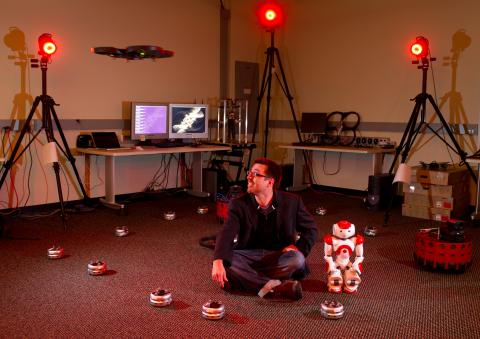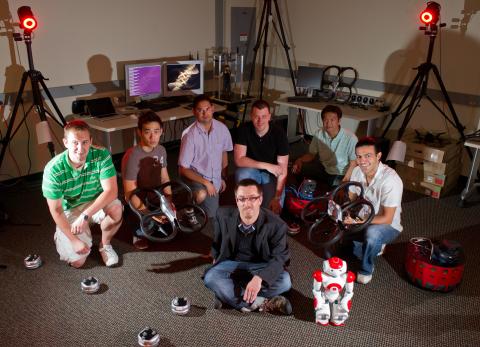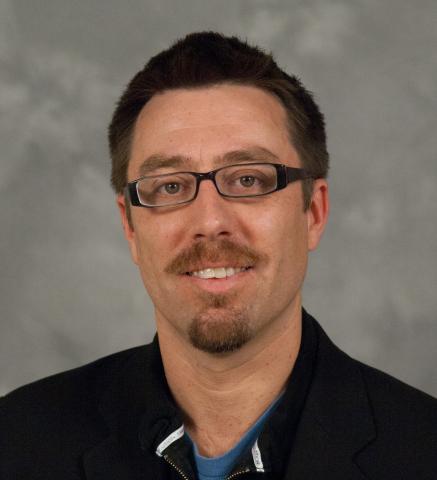Magnus Egerstedt is among five faculty members from the Georgia Institute of Technology teaching the first courses offered by Georgia Tech on Coursera. A professor in the School of Electrical and Computer Engineering, Dr. Egerstedt will teach “Control of Mobile Robots,” which is scheduled to be taught for the first time in January 2013.
Magnus Egerstedt is among five faculty members from the Georgia Institute of Technology teaching the first courses offered by Georgia Tech on Coursera. A professor in the School of Electrical and Computer Engineering, Dr. Egerstedt will teach “Control of Mobile Robots,” which is scheduled to be taught for the first time in January 2013.
This course investigates how to make mobile robots move in effective, safe, and predictable ways. The basic tool for achieving these actions is “control theory,” which deals with how dynamical systems–systems whose behaviors change over time–can be effectively influenced. With mobile robots as the target application, the course will cover the following tasks: (1) how to make teams of wheeled ground robots avoid collisions while reaching target locations; (2) how to make aerial, quadrotor robots follow paths in the presence of severe disturbances such as wind and faulty or missing GPS readings; and (3) how to make bipedal, humanoid robots walk. Upon completion of this course, students will receive a Certificate of Completion from the Georgia Tech Center for 21st Century Universities.
Last month, Georgia Tech signed an agreement with Coursera to put their web-based courses online and create new opportunities in the classroom. Dr. Egerstedt said that the Georgia Tech Coursera effort attracted him because he was both excited and curious about having an educational impact that stretches far beyond what he could accomplish in a traditional classroom.
Dr. Egerstedt was also motivated to participate in Coursera because he thinks higher education is increasingly moving toward using technology to make classes and faculty expertise more available to students and lifelong learners worldwide. And indeed, to date, Coursera has seen more than 680,000 students from 190 countries and more than 1.55 million course enrollments across its 43 courses.
“Coursera provides a platform that allows me to scale up my classes, so that they reach thousands of people–in essence having more students in one single class than what I have had in total over my entire career as an educator,” Dr. Egerstedt said. “I also wanted to see for myself what it would be like to teach a massively large-scale, on-line class.”
During the spring 2013 semester, he will also teach a course on campus that is very similar to Control of Mobile Robots. He hopes to leverage it in a way that allows him to do more hands-on experiments and projects in the classroom while some of the technical content is outsourced to the Coursera course that he is teaching that same term.
An award-winning teacher with honors from both Georgia Tech and Harvard University, Dr. Egerstedt has been on the ECE faculty since 2001 and is the director of the Georgia Robotics and Intelligent Systems Laboratory. He is a Fellow of the IEEE and a recipient of the National Science Foundation CAREER Award.
In addition to Dr. Egerstedt’s course, Georgia Tech will offer Computational Photography, Computational Investing, Energy 101, and Fundamentals of Online Education: Planning and Education. The Institute plans to add more online courses across a range of disciplines to its portfolio with Coursera.
About Coursera
Coursera is on a mission to change the world by educating millions of people by offering classes from top universities and professors online for free. Coursera's comprehensive education platform combines mastery-based learning principles with video lectures, interactive content and a global community of peers, offering students from around the world a unique online learning experience. Coursera has partnered with top-tier universities to provide courses across a broad range of disciplines, including medicine, literature, history and computer science, among others. Coursera is backed by leading venture capital firms Kleiner Perkins Caufield & Byers and New Enterprise Associates. For more information, visit Coursera.org.
Additional Images


